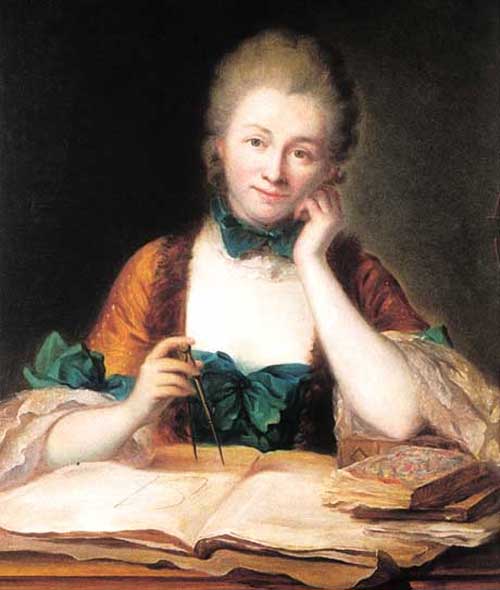Émilie du Châtelet (1706-1749)
Despite her progressive education, Emilie couldn't completely escape the conventions of the day. Although being of a ‘passionate nature’ with no lack of romantic attachments in her youth, she was still formally married at the age of 18, within the French court, to the Marquis Florent-Claude du Chastellet-Lomont, who was twelve years her senior. Emile thrived at court; she enjoyed dancing, acting and playing music, and thanks to her mathematical talents she was quite the keen, and successful, gambler!
After leaving court to marry and have three children (also suffering the death of her youngest son when he was an infant), aged 26 Emilie returned to court, and resumed her studies in mathematics, tutoring under some of the finest academics of the day. Her husband spent most of his time on garrison duties, which meant that he spent long periods away from his wife, but Emilie was never in want of entertainment or company.
Emilie had met Voltaire as a teenager and from their early friendship it was clear they were kindred spirits. Although they met through Emilie’s father’s academic connections when she was still young, their friendship became cemented once Emilie returned to society. This was a meeting of minds, of hearts, and it has to said, loins. The Marquis, had an understanding attitude to his wife’s attachments (Voltaire was by no means her only lover since her marriage); in fact, evidence shows that the three had a good friendship – how very modern!
Voltaire resided at the couple’s country home while in exile, where he added a library and collection of scientific instruments. His love for Emilie ran deeper than lust; he loved and admired her mind and enthusiasm for life. He wrote of her: ‘I found in 1733 a young lady who felt more or less as I did, and who resolved to spend several years in the country to cultivate her mind, far from the tumult of the world. It was the marquise Du Châtelet, the woman who in all France had the greatest disposition for all the sciences. ... Seldom has so fine a mind and so much taste been united with so much ardour for learning; but she also loved the world and all the amusements of her age and sex.’ – Oh Voltaire, sigh.
Emilie was keen to apply all her years of study and Voltaire encouraged her; she jointly worked on a translation of Newton’s theories with him, wrote a book on physics Institutions de Physique in 1740, and in 1744 a paper entitled Dissertation sur la nature et la propagation du feu, based upon her research into the science of fire and light. She was in regular discussion with famous mathematicians of the day, including Maupertuis and Clairaut – another one of her lovers – and through her translation of Mandeville's The fable of the bees, she wrote a preface of her own ideas of morality, arguing strongly for the importance of educating women.
Emilie took another lover in 1748, the poet Jean-Francois de Saint-Lambert, and quickly fell pregnant. This did not dim Voltaire’s love for her and their friendship continued, he even helped her keep peace with her husband over this indiscretion. She worked on her writing throughout her pregnancy, sacrificing only her social life at court to make room for her work. She gave birth to a daughter in 1749, going into labour while still at her writing desk. Alas, the work was to be her last, a few weeks later, her baby daughter died, and Emilie followed a few days later, apparently from an pulmonary embolism, she was only 43.
For such a short life, Emilie achieved so much, living her life to the fullest, especially for someone of her sex at that time – shunning convention and embracing knowledge, academia, friendship and love with all she had, and the inspiration of that is a legacy in itself. But more than that she is considered to be one of the most influential mathematicians of her time, her influence shaping the subject into what is know today, and shaping the hearts of her peers, especially Voltaire… a true libertine bluestocking if ever there was one!

No comments:
Post a Comment